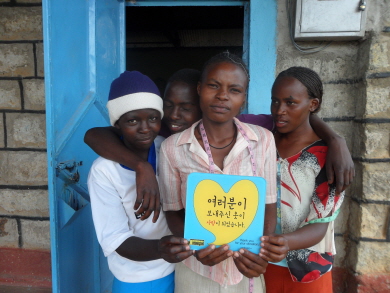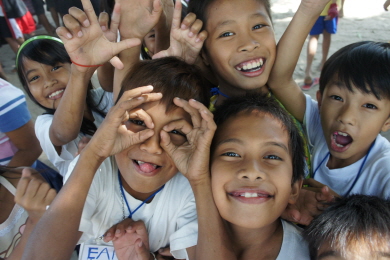
Otcan, a non-profit organization founded in 2009, collects and sells people’s second-hand clothes and used books to children in the developing world. The beneficiary countries include Ghana, Cambodia, Laos, India and Sri Lanka, to name just a few. The name Otcan is a hybrid term combining ‘ot,’ the Korean word for clothing and the word ‘can’ in English. The name demonstrates that Otcan is transforming unwanted clothing items into meaningful gifts.
Cho’s idea for this project derived from one single question: what happens to the used clothes that people put in the green boxes that reads, “Please deposit used clothes”?
“Many people think they are doing good when they put their old clothes in those green boxes,” Cho said. “Contrary to their belief, however, these clothes are utilized as a means for individual profits. People who have set up these boxes sell the collected clothes to others and take the benefits for themselves.”
This unsettling discovery triggered Cho to launch his own program, Otcan.
Cho originally planned to collect and send used clothes to the children of the developing world for free. However, he soon realized that free clothes can have an adverse effect on the local garment industry, which was far from what he was hoping to happen. Therefore, he came up with a new plan of selling these clothes in the developing world and returning the profit back to the locals by organizing diverse projects.

Cho recalled the start-up period of establishing Otcan: being in a small warehouse with a computer and one or two participants. When Cho was first to conceive the plan for Otcan, donating “money” was the first thing that people thought of upon hearing about “donations”; donating clothes was unfamiliar to most. Therefore, Cho turned his eyes to young people, especially students, who cannot afford to donate money but wanted to help others in some other way. He believed young people could be the primary donors to usher in a new culture of donating personal items in the Korean society.
Now, Otcan has shown 1,050 percent growth since its establishment, receiving 210 tons of clothes in 2014. Cho attributes Otcan’s extraordinary growth over the last six years to people’s urge to do something meaningful.
“What has been hampering people’s willingness to donate was the stereotype that only monetary donations can help others, which often make people think ‘I will donate when I earn more in the future,’” Cho said. “However, I believe Otcan has removed such misconception by encouraging people to do something good by donating their daily items.”
When asked about the most memorable donor, Cho recalled an old man who called and said that he wanted to personally donate his clothes. At first, he seemed like an ordinary donor, but later turned out to be an aging patient with a terminal illness. A few weeks later, after he passed away, his sons sent the man’s clothes to Otcan along with a letter of appreciation written by the old man.
“It was the first and the last time an elder personally donated his clothes, while there have been many instances where sons and daughters donate their parents’ clothes after they passed away,” Cho said.
To achieve Cho’s goal, of bettering the lives of children in the developing countries, Otcan has broadened its scope from clothes to hygiene and art education.
Through countless encounters with children in the developing world, Cho found out that what these children need the most is hygiene education, as children are often not aware of the fact that simple measures of personal hygiene can keep people safe from life-threatening germs. Otcan teaches children how to keep up with sanitation by providing education such as how to make liquid soaps.
“I believe Otcan’s diverse projects can teach children that a hygienic environment can be achieved with very small actions, eventually raising children into healthy individuals who can change the world in the future,” Cho said.
Park Kyoung-eun
kathypark226@ewhain.net

